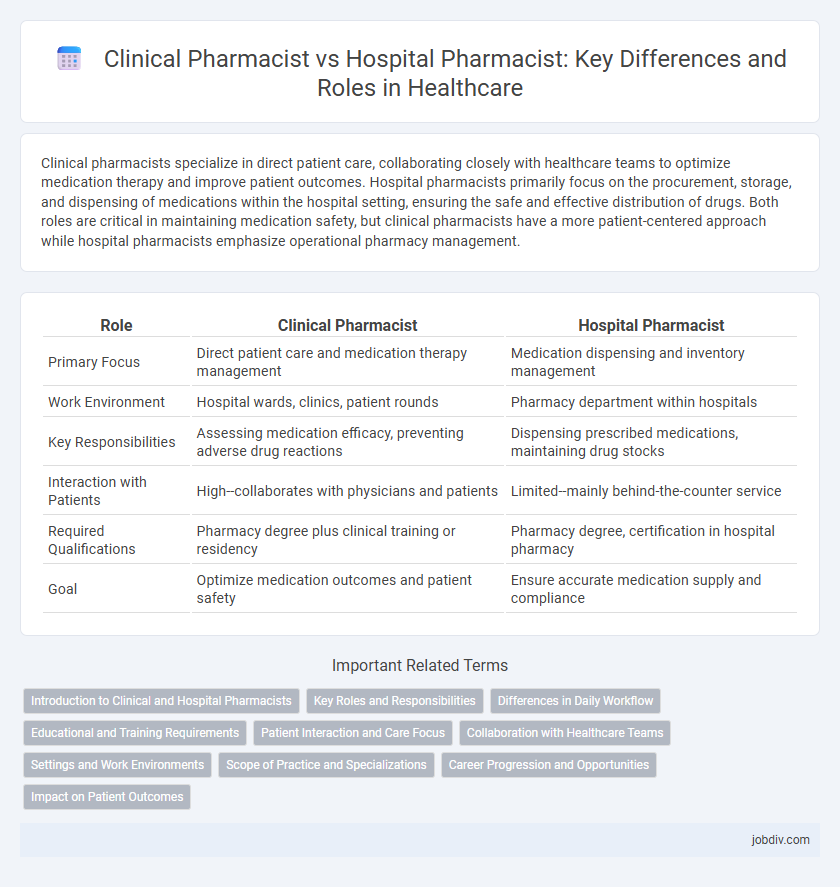Clinical pharmacists specialize in direct patient care, collaborating closely with healthcare teams to optimize medication therapy and improve patient outcomes. Hospital pharmacists primarily focus on the procurement, storage, and dispensing of medications within the hospital setting, ensuring the safe and effective distribution of drugs. Both roles are critical in maintaining medication safety, but clinical pharmacists have a more patient-centered approach while hospital pharmacists emphasize operational pharmacy management.
Table of Comparison
| Role | Clinical Pharmacist | Hospital Pharmacist |
|---|---|---|
| Primary Focus | Direct patient care and medication therapy management | Medication dispensing and inventory management |
| Work Environment | Hospital wards, clinics, patient rounds | Pharmacy department within hospitals |
| Key Responsibilities | Assessing medication efficacy, preventing adverse drug reactions | Dispensing prescribed medications, maintaining drug stocks |
| Interaction with Patients | High--collaborates with physicians and patients | Limited--mainly behind-the-counter service |
| Required Qualifications | Pharmacy degree plus clinical training or residency | Pharmacy degree, certification in hospital pharmacy |
| Goal | Optimize medication outcomes and patient safety | Ensure accurate medication supply and compliance |
Introduction to Clinical and Hospital Pharmacists
Clinical pharmacists specialize in direct patient care within healthcare teams, optimizing medication therapy and improving health outcomes through detailed patient assessments and drug therapy management. Hospital pharmacists primarily manage medication procurement, storage, and distribution within hospital settings, ensuring the safe, effective, and efficient use of pharmaceuticals across all departments. Both roles play critical parts in healthcare systems by ensuring medication safety, but clinical pharmacists focus more on patient-centered care while hospital pharmacists emphasize operational medication management.
Key Roles and Responsibilities
Clinical pharmacists specialize in patient-centered care, working directly with healthcare teams to optimize medication therapy and ensure safe, effective treatment outcomes. Hospital pharmacists primarily manage the procurement, storage, and distribution of medications within a hospital setting while overseeing medication safety protocols and compliance. Both roles are crucial in reducing medication errors, improving patient care, and enhancing overall healthcare delivery in clinical environments.
Differences in Daily Workflow
Clinical pharmacists prioritize direct patient care by reviewing medication therapies and collaborating closely with healthcare teams to optimize treatment outcomes, often participating in rounds and patient consultations. Hospital pharmacists focus on the preparation, dispensing, and management of medications within the pharmacy setting, ensuring accurate dosage and regulatory compliance. The clinical pharmacist's workflow is patient-centered with a strong emphasis on therapeutic decision-making, while the hospital pharmacist's responsibilities revolve around inventory control and medication safety protocols.
Educational and Training Requirements
Clinical pharmacists require a Doctor of Pharmacy (PharmD) degree and typically complete additional residency training focused on patient care and clinical decision-making. Hospital pharmacists usually hold a Bachelor or Doctor of Pharmacy degree and receive on-the-job training in medication dispensing, inventory management, and hospital protocols. Both roles demand licensure, but clinical pharmacists often pursue board certification in specialized areas to enhance their expertise in direct patient care.
Patient Interaction and Care Focus
Clinical pharmacists engage directly with patients, offering personalized medication therapy management and monitoring to optimize treatment outcomes. Hospital pharmacists primarily focus on medication dispensing, ensuring accurate preparation and distribution of drugs within the healthcare facility. Patient-centered care is more prominent in the clinical pharmacist role, emphasizing therapeutic decision-making and interdisciplinary collaboration.
Collaboration with Healthcare Teams
Clinical pharmacists enhance patient care by collaborating closely with physicians, nurses, and other healthcare professionals to optimize medication therapy and prevent adverse drug events. Hospital pharmacists primarily focus on the procurement, preparation, and dispensation of medications but also support healthcare teams by providing drug information and ensuring safe medication use. Effective collaboration between clinical and hospital pharmacists fosters comprehensive medication management and improves overall patient outcomes in healthcare settings.
Settings and Work Environments
Clinical pharmacists primarily operate within healthcare settings such as hospitals, clinics, and outpatient care centers where they collaborate closely with medical teams to optimize medication therapy. Hospital pharmacists typically work within hospital pharmacies, managing medication distribution, inventory control, and ensuring compliance with safety regulations within inpatient and emergency departments. Both roles demand a deep understanding of pharmacology, but clinical pharmacists engage more directly with patient care while hospital pharmacists focus on medication logistics and regulatory adherence.
Scope of Practice and Specializations
Clinical pharmacists specialize in patient-centered care, focusing on medication therapy management, optimizing drug efficacy, and minimizing adverse effects through direct interaction with healthcare teams. Hospital pharmacists manage drug procurement, storage, dispensing, and ensure adherence to hospital protocols, maintaining the overall supply chain and medication safety. Their scopes overlap in medication expertise, but clinical pharmacists typically engage in therapeutic decision-making and specialized areas such as oncology or cardiology, while hospital pharmacists emphasize operational pharmacy services.
Career Progression and Opportunities
Clinical pharmacists specialize in direct patient care and medication therapy management, enabling career advancement through specialized certifications and roles in multidisciplinary healthcare teams. Hospital pharmacists often progress by managing pharmacy operations, logistics, and regulatory compliance, with opportunities to lead pharmacy departments or hospital-wide committees. Both roles offer distinct career pathways, with clinical pharmacists focusing on patient-centered care and hospital pharmacists emphasizing operational leadership and administration.
Impact on Patient Outcomes
Clinical pharmacists directly collaborate with healthcare teams to optimize medication therapy, significantly reducing drug-related errors and adverse events. Hospital pharmacists primarily focus on the safe dispensing and management of medications, ensuring compliance with hospital protocols and inventory control. Studies show clinical pharmacists' involvement enhances patient outcomes by improving therapeutic efficacy and minimizing hospital readmissions.
Clinical Pharmacist vs Hospital Pharmacist Infographic

 jobdiv.com
jobdiv.com